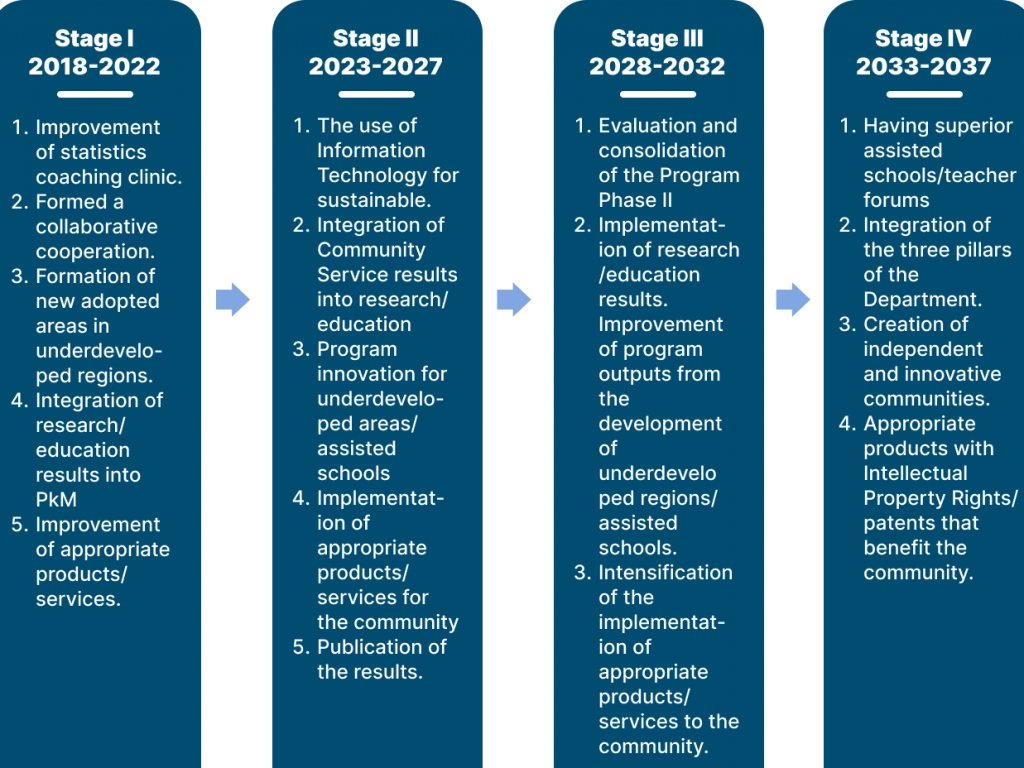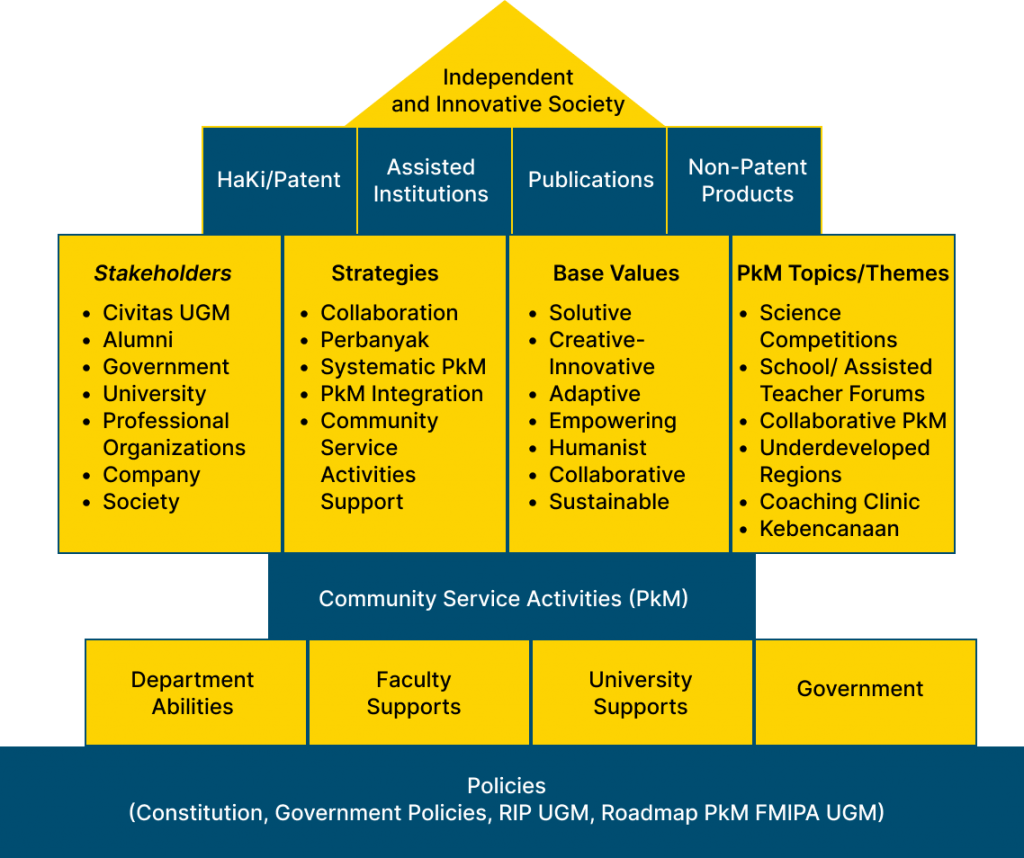Community service activities (hereinafter abbreviated as PkM) are one of the obligations of the higher education community in Indonesia as a component of the Tridharma of Higher Education, especially for lecturers and students. In the last few years, UGM has been promoting PkM activities that are targeted and planned in the medium and long term.
Gradually, the commitment of the Department of Mathematics to implementing PkM in a planned and directed manner already has signs, namely the 2017–2037 UGM Development Master Plan, the 2017–2027 Community Service Roadmap for FMIPA UGM, and the 2018–2022 Department of Mathematics Strategic Plan.
At the department of mathematics level, the number of lecturers involved in PkM activities is quite large, around 48 out of 51 department of mathematics lecturers each year. In addition, the potential to involve students and education staff is also quite high. The average number of communities that become PkM targets per year is five in the last four years. Funding support, both internal (UGM, FMIPA, Department of Mathematics) and external (Dikti through grant opportunities), is quite good. The PkM activities that have been running so far have an average of 10 activities per year.
Even though so far the number of PkM has been very good compared to the number of academicians in the Department of Mathematics at UGM, especially the number of lecturers, from the implementation side, PkM activities are still held separately per group. There is no integrated departmental program and no planned PkM program with specific objectives. Communities that are targeted are generally only visited once, and no follow-up has been carried out.
To achieve the vision of the Department of Mathematics in 2037 in the field of community service, the Department of Mathematics must be able to actively contribute to creating an independent, creative, and innovative society. To achieve this, the community service program (PkM) of the Department of Mathematics is planned continuously through four five-year stages. Each stage has quantifiable and progressive qualitative targets. The previous stage serves as the foundation for the implementation of the next stage of PkM. Qualitatively, the targets of the PkM are outlined in the following stages.

The community service program (PkM) of the Department of Mathematics can reach a wide range of targets in society. Among these targets, the Faculty of Mathematics and Natural Science at Universitas Gadjah Mada has set several quantitative indicators as targets to measure the achievement of the PkM goals, including:
- The number of schools/Mathematics Teachers Working Group (MGMP) that become foster schools/MGMP,
- The number of student involvements in PkM,
- The number of integration of PkM results in learning,
- The number of PkM collaborations established with external parties, and
- The number of appropriate products or technologies utilized by the community
Basic Value
In its implementation, PkM for the UGM Mathematics Department is based on several basic values, namely: solving, creative-innovative, adaptive,empowering, humanist, collaborative, and sustainable.
- Solutive
PkM is expected to be able to solve problems in the community related to its areas of expertise (mathematics, statistics).
- Creative-innovative
In helping solve problems that develop in the community, PkM must be creative in finding innovations that are appropriate for the community so that these solutions can be adopted by the community in a sustainable manner and enable the community to innovate independently.
- Adaptive
PkM activities must be able to adapt to the latest developments in science and technology while still adapting to the conditions of society, including both sources of funds and the mindset, facilities, and culture of that society.
- Empowering
PkM activities must be able to empower the community by increasing reasoning power, knowledge, and abilities that lead to community self-reliance.
- Humanist
PkM must pay attention to community rights, the principle of equality, and ethics that apply in society by upholding local wisdom.
- Collaborative
All PkM activities must be able to optimize cooperation and collaboration with related parties, such as the community, government institutions, alumni, and peer universities, according to the theme of each PkM.
- Sustainable
PkM activities must be continuous, accompanied by evaluation and improvement actions to optimize results.
Community Service Theme
In principle, all areas of society related to mathematics, statistics, and actuarial science can be used as a theme for community service by members of the UGM Mathematics Department, both local (DI Yogyakarta) and national (Jakarta), as well as international. However, there are several themes that are prioritized for PkM activities, namely:
- National Science Olympiad/Competition in Mathematics and Statistics;
- Fostered schools/MGMPs;
- PkM cross-university collaboration
- 3T area assistance;
- Consultation (coaching clinic) statistics in the field of medicine, pharmacy, and other scientific fields;
- Disaster emergencies such as earthquakes, volcanic eruptions, tsunamis, and disease outbreaks.
The following is a conceptual framework for the PkM Department of Mathematics.

For more information about the PkM Roadmap, you may visit the following link.
